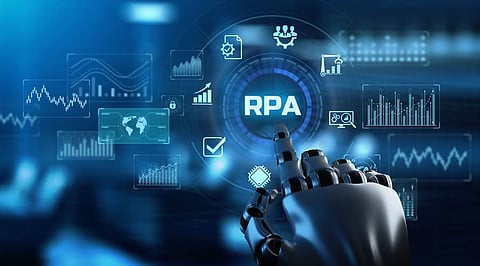

Working with a data scientist, an RPA developer can simplify a lot more critical procedures than operating alone
Robotic Process Automation and data science have had a mutually beneficial and completely equal relationship. RPA bots could perform punctual behavior with the aid of insights gained from data science's advanced analytics, giving the bots more knowledge and business relevance.
RPA's automation, on the other hand, has recently progressed into the domain of data science. This is part of a larger trend toward data science digitization, which includes self-service analytics tools, machine learning, and visual frameworks for building predictive models.
RPA's effort is aided in two ways, in particular. The first entails a variety of AI techniques such as deep learning, natural language processing, and computer vision. RPA can also be used to automate key aspects of the predictive model development process, such as choosing the best algorithm for completing work processes and implementing it.
This advancement would allow RPA to expand and diversify into data science, providing business user with the best data to help them perform their duties more effectively and genuinely revolutionizing AI.
The primary responsibility of a data scientist is to manage and analyze vast amounts of data using custom-designed analytic tools so that stakeholders can make rational business decisions. A data scientist usually performs a variety of tasks. However, there are some basic responsibilities:
RPA Developers assist businesses in the design, development, and implementation of robotic process automation (RPA) systems. They set up and evaluate automated business activities using various automation tools such as Automation Anywhere and UiPath. They are responsible for a variety of tasks for the company, including:
Usually, the two teams that can solve different complex data problems, namely RPA developers and Data scientists, do not collaborate. Data scientists and RPA developers have compatible skill sets. New workflows that exploit both can be configured with the right management. When this happens, it is possible to scale machine learning more quickly, free up data scientists for more challenging tasks, train RPA developers, and make effective use of both teams in terms of business outputs.
The benefits that RPA developers and data scientists can provide to companies are broader than the amount of their sections when leaders bring them together. Working with a data scientist, an RPA developer can simplify a lot more critical procedures than operating alone, and a data scientist collaborating with an RPA developer can work quicker and concentrate better than it has ever been.
Even, if managers can bridge the divide between these teams, they can uncover huge opportunities for their businesses. To do that, managers must make it possible for data scientists to convey their needs to RPA developers and for all teams to work together to produce better results on complex issues.
Join our WhatsApp Channel to get the latest news, exclusives and videos on WhatsApp
_____________
Disclaimer: Analytics Insight does not provide financial advice or guidance. Also note that the cryptocurrencies mentioned/listed on the website could potentially be scams, i.e. designed to induce you to invest financial resources that may be lost forever and not be recoverable once investments are made. You are responsible for conducting your own research (DYOR) before making any investments. Read more here.
